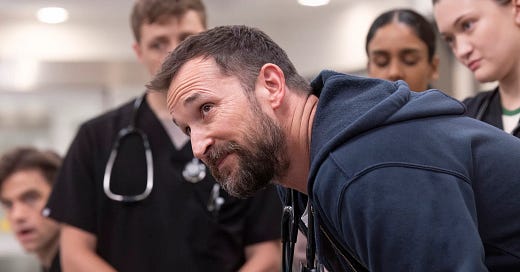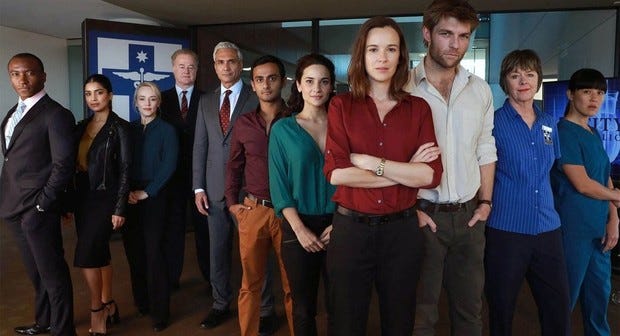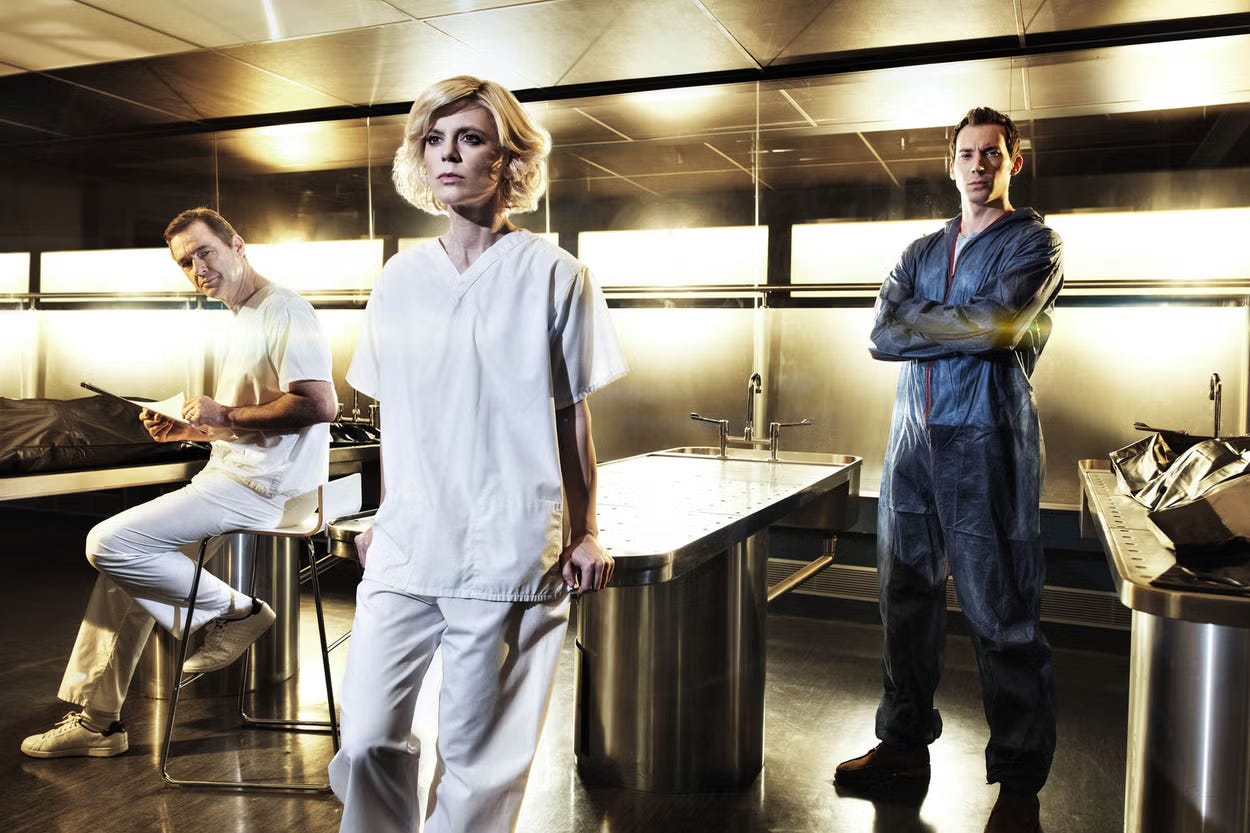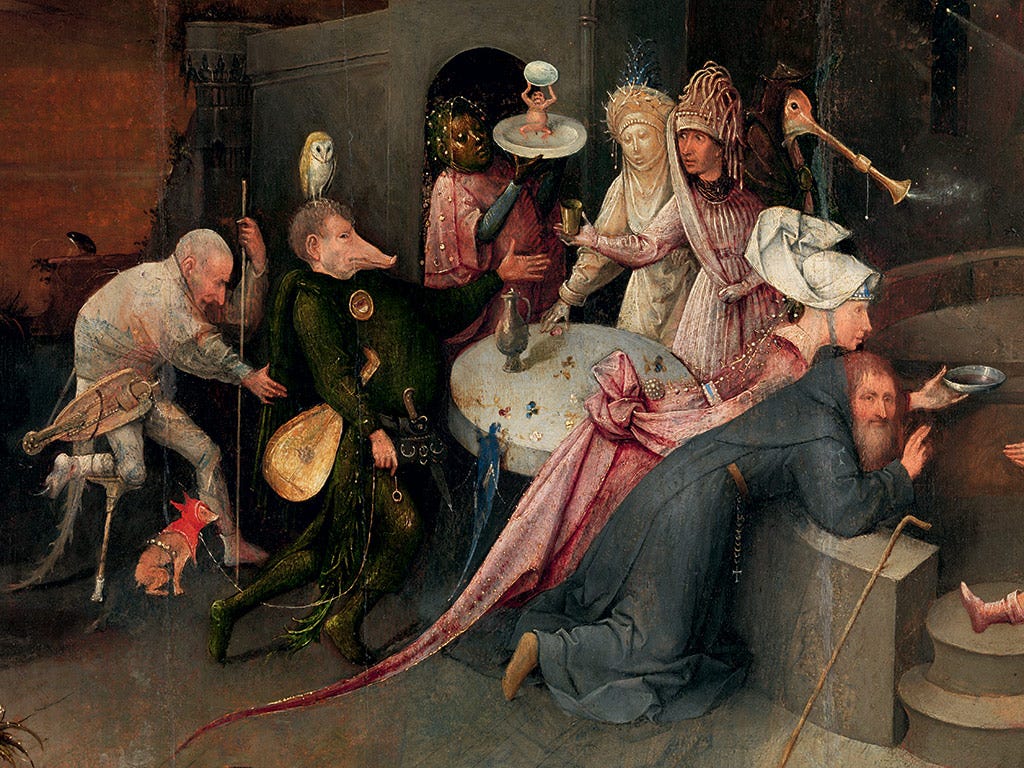Vital television: medical dramas - prestige or trash?
The Good, the Bad and the Unwatchable (Part 1)
The gushing reviews of HBO’s recent offering, The Pitt, have sparked a resurgence of interest in the medical drama: a once maligned art form, viewed through spread fingers in cringing embarrassment, now experiencing a renaissance. The series has not just re-legitimised the genre, but has elevated it to the lofty heights of ‘prestige television’ among the likes of The Wire, Succession and The Sopranos. Could the age of the medical soap opera soon be over and the Golden Age of Medical Drama be upon us? Step aside McDreamy, welcome McDepressed, McOverworked, McGrittyRealism. But with shows like The Resident and New Amsterdam still doing the rounds on commercial channels, it shows the genre remains a very mixed bag. For every Pitt, there appears to be seven others that are as inexplicably popular as they are total garbage. I’m going to take you through a few gems as well as a few stinkers that you might not have heard of before. There’s more to come but this is a good start if you’re looking for your next ‘hate-watch’, or more rarely, just ‘watch’.
Pulse (2017)
Australian TV dramas are, to say the very least, patchy. To be honest, that would be a generous review, as most are infinitely more crap than you can ever imagine. While a few distinguish themselves such as The Slap or Seven Types of Ambiguity, many more suffer from the awkward, stilted acting that is partially due to the Australian accent (which is often embarrassing even for the most dyed-in-the-wool Aussie to watch), and a total absence of prestige television culture in our small and mostly broke nation.
Pulse was no expectation in this regard, a series I watched first in medical school and wrote up in our university magazine at the time. Following the story of a young nephrology registrar at a city hospital tackling gender discrimination and toxic workplace culture, it unfortunately is afflicted by many of the same cliches and tropes that infect other such projects. ‘WELL, SORRY I DON’T HAVE TESTICLES!’ and ‘Condoms break, Lucy! Don’t you remember how Luke was born?’ are two such very real lines from Pulse’s extremely thin dialogue. This is not, in fact, a Micallef sketch.
The series also loses marks for just about the worst chest compressions I’ve ever seen, and the playing of mid-2000s Australian hip-hop over a supposedly touching scene. The series was so bad that at the time it aired, I was almost certain the ABC would renew it for another season. I am delighted to report they didn’t, leaving more airtime for re-runs of Grand Designs: New Zealand. Now that’s drama.
Silent Witness (10,600 BC - present)
Now into its millionth season, the forensic pathologists on Silent Witness have seen more personal jeopardy in their line of work than most paratroopers in World War II or local ‘dodgy woman’ in Salem circa 1691. For the uninitiated, Silent Witness follows the investigation of heinous murders from the perspective of the forensic pathology team, working in impossibly immaculate surroundings that are clearly not NHS funded. But they don’t just cut open victims to find all sorts of incriminating things like bullets or tinea. Indeed, they often find themselves in the firing line of those bullets: interviewing witnesses themselves, chasing bad guys, and saving the day in a way their union would surely disapprove of.
In one episode, one pathologist is forced to fake his own death while investigating a case in Budapest, after being falsely accused of murdering his own lover. He rips the crowns from his jaw and plants them in the mouth of the burnt corpse of his would-be assassin. In another episode, the head of department is actually killed by a s****de bomber in Afghanistan. In yet another, Dr Alexander is buried alive by gangsters. The list goes on. From my understanding many doctors choose to enter pathology to limit their interaction with the rest of humankind - these guys clearly didn’t get the memo.
Where this series sacrifices plausibility, it redeems itself with its graphic autopsy scenes for which it garnered infamy in its earliest seasons. I’m a fan, if even just for this. Not everyone is, however. As one of our forensic pathology lecturer’s would call it: ‘Witless Silence’.
Bodies (2004-2006)
Written by Jed Mercurio (Bodyguard, Line of Duty) - a former doctor himself - this series documents the grim goings-on in the life of an obstetrics & gynaecology registrar called Rob Lake. He has just joined the ‘firm’ at a NHS hospital in northern England, which is to say he has walked into just one of the UK’s world-famous fiery pits of hell. In contrast to the glistening benchtops and manicured linoleum of American medical dramas, the wards of Rob Lake’s hospital are no oil painting. Or if an oil painting had to be chosen, it’s one of those Heironymous Bosch nightmarish landscapes - you know, the one with a guy with fish for a head with his dick on fire.
The hospital here is as much a character as any of the actual players, its drab yellowed walls, peeling paint, CCTV and overflowing wards making your skin crawl by sheer recognition. You might believe that you, too, were turning up to another ward round, groggy eyed at 7.30 in the morning, greeted by the sallow, ashen faces of the nurses who look at you as if you’ve just pissed on their dog. Medical errors, professional backstabbing and illicit affairs abound. In one episode, Rob responds to a code blue for one of his patients in the throes of full anaphylaxis and needing emergency tracheal access. With other doctors nowhere to be found he attempts to perform a cricothyroidotomy by himself. In any other series this would be a heroic moment where he saves the day triumphing over adversity. But this is not to be. He fails, somewhat spectacularly, and has to manage his feelings of guilt and regret for the rest of the series while also carrying the burden of his consultant’s incompetence and battling a crooked hospital admin. A read feel bad series. It’s amazing, but maybe for those who now have some distance from the toxic environment portrayed in the story. If not, it could just feel like another day at work.
The Good Doctor (2017-2024)
I’m not sure where more can be said than what was said in my recap of s2 e17 a couple of months ago. My only addition is that I have noticed a page on Instagram which now uses scenes from The Good Doctor as clinical vignettes encouraging their followers to become ‘better doctors’ - probably by signing up to some incredibly dodgy coaching service. This is like showing a class of carpentry apprentices an episode of Bob the Builder as inspiration. Perhaps it is testament to the theory that medical training is game-over if we’re looking to Shaun Murphy as our generation’s William Osler.
This is Going to Hurt (2022)
We’re back in the NHS, baby, but this time with slightly more humour. It is unclear whether to call this a medical drama or comedy or both. The book, a collection of diary entries by ex-doctor and author Adam Kay, which I read back in medical school, was certainly funnier: each small vignette designed to capture the absurdity of working in the public healthcare system. The television series starring Ben Whishaw, has a more conventional narrative structure with key supporting players you grow to enjoy the company of, and others who you are devastated by, especially in the season’s harrowing finale. It is at once hilarious (full of dry and often insulting one-liners) and also one of the most honest representations of life at the medical coalface in the UK’s crumbling health system since Bodies. I dread the Americans doing a re-make. Hands off, yanks. Get your own harrowing nightmare.
There are countless more series that need careful examination, which I look forward to doing - if you’ll let me. Consider becoming a paid subscription to let me do this. Do you know how much Paramount+ costs these days?








